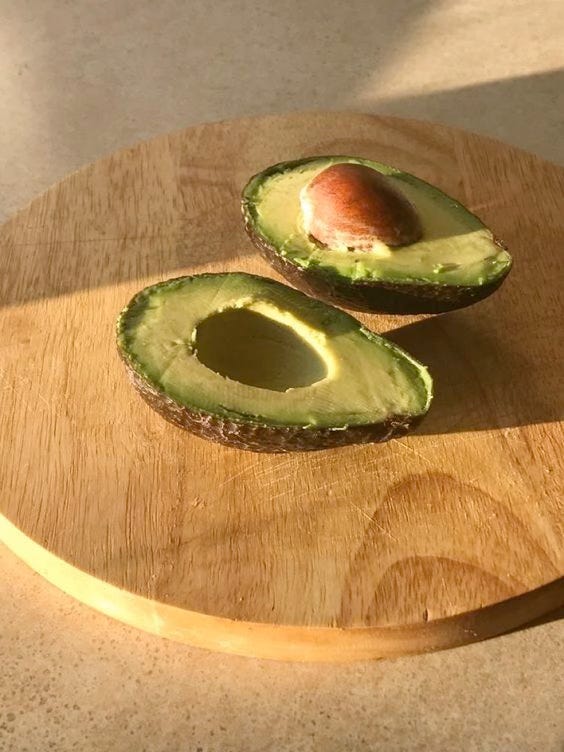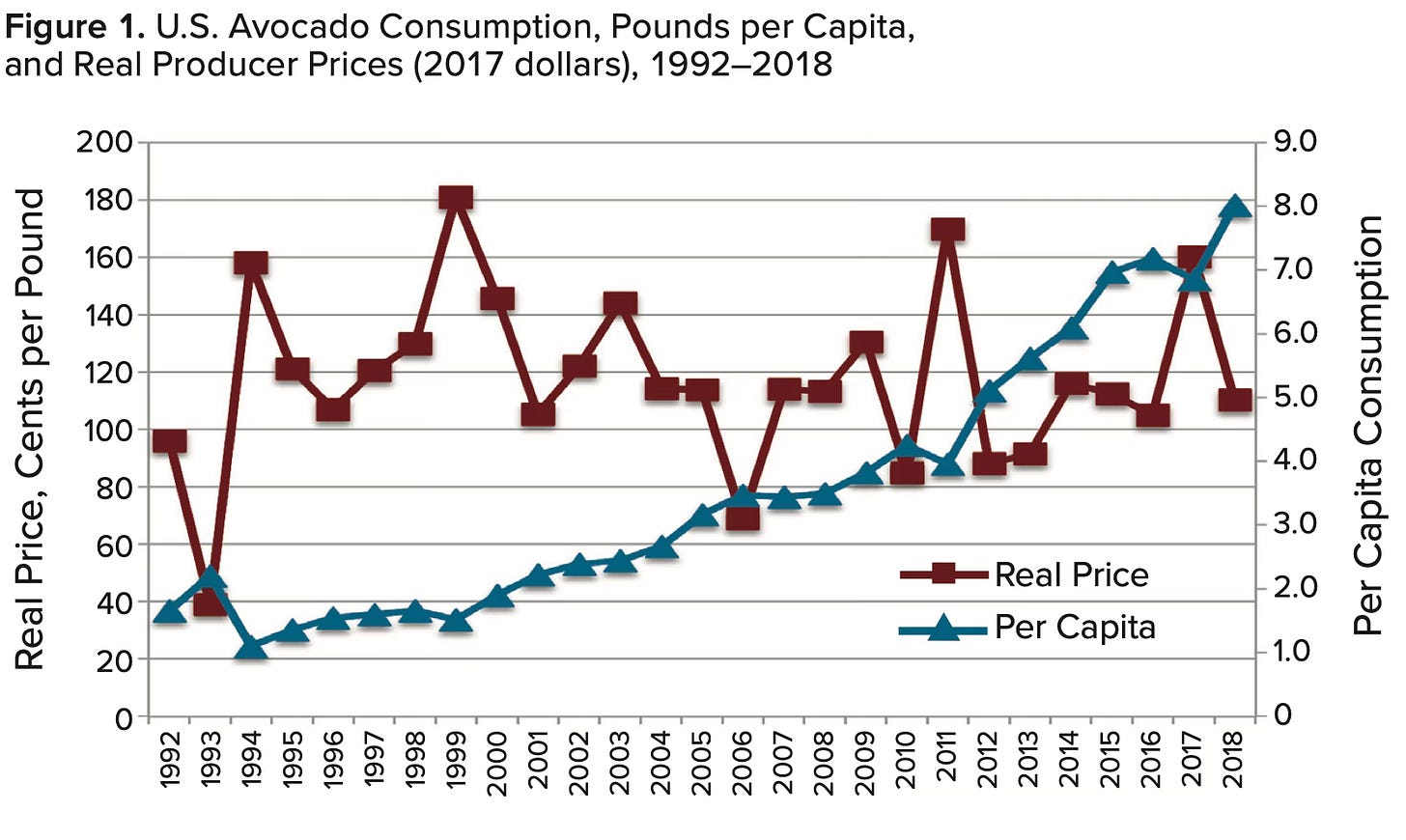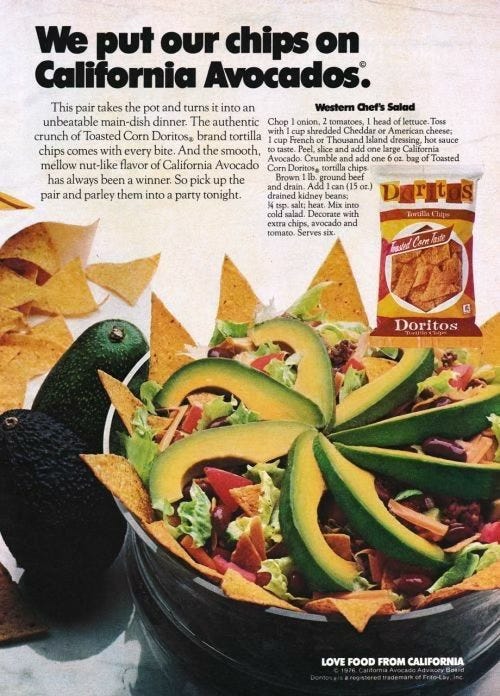While enlightened readers of Tan Land know that avocado oil is not a seed oil, but a fruit oil akin to olive oil, avocado oil is still a scam.
What’s this? Are not avocados the main mascot of 21st century “wellness”?
While avocados themselves might be fine, it’s only part of the story. In truth, avocado oil is not the elixir of wellness that the Health Food Industry and millennial yoga influencers would have you believe.
In today’s post, we will reveal the reasons behind this and learn about why we should avoid avocado oil (almost) as steadfastly as we disrespect seed oils.
Disclaimer: I have nothing against the humble avocado - just avocado oil.
The Rise of the Avocado
These days, avocados are everywhere.
Whether it’s sliced onto sourdough toast for an Instagram-worthy brunch or blended into a pre-pilates green juice, the avocado has become a cornerstone of every “health-conscious” American’s diet.
Yet, in the not too distant past, the average American had no idea what an avocado was. They might as well have been an alien fruit to your parents. Although avocados have been a staple across Latin America for centuries, they only started to appear in US grocery stores in the late-1900s.
For most of the 20th century, import restrictions prevented foreign avocado producers from accessing the US market (maybe the banana monopoly thought it would cut into their sales?). When restrictions were eventually lifted, the US government had decided that low-fat diets would solve the growing obesity problem. As a result, the avocado, which is high in fat, became antithetical to mainstream health.
But in the 1990s, the California Avocado Commission decided that avocados had been unfairly demonized (i.e., they weren’t making enough tax revenue from avocados), and rebranded the fruit through various marketing campaigns.
After all, if other cultures had been feasting on this strange fruit forever, surely it wasn’t all bad? Thus before long, the avocado had become America’s newest superfood.
And rightly so, to some extent — raw avocados are packed with important nutrients — but the various derivative avocado abominations that have found their way into grocery stores since? Not so much.
Enter Avocado Oil
Following the avocado’s rapid rise to fame, the ascendancy of avocado oil comes as no surprise.
In 2022, the avocado oil market was valued at $594 million and it’s expected to grow over 5.4% every year from 2023 to 2032. It’s fair to say that avocado oil is a pretty lucrative business right now.
And thus the money-grabbing food purveyors have wasted no opportunity to squeeze out every cent.
But why is avocado oil so popular?
What the Avocado Oil Advocates Say
“Avocado oil is one of the most nutritious and healthiest cooking fats.”
For the most ardent avocado oil appreciators, avocado oil is a holy grail of countless healthy nutrients from vitamin E to lutein. While the purest, unrefined, cold-pressed avocado oil might live up to these claims, similar to olive oil, the vast majority of the stuff does not.
Many people like to assume that avocado oil is simply made through squeezing a load of avocados into a big vat. An idyllic picture really, similar to how they think olive oil is made.
In reality, as we will see later in this post, it’s not that simple.
“Fine, but avocado oil is the best cooking fat because it has the highest smoke point”
Sure, avocado oil has the highest smoke point of any cooking fat, but as I’ve said before, the idea of smoke point is a scam, and says nothing about the quality of the fatty acids themselves that you are eating.
For a quick refresher, the “smoke point” of an oil refers to the temperature at which an oil will start to give off smoke. Many people falsely believe that a higher smoke point means an oil can withstand a higher temperature without oxidizing. This is in fact untrue.
Oxidative stability has almost nothing to do with smoke point. Smoke point is actually related to the “free fatty acid” content of oils, which in most scenarios, is less than 1%, and is lower the more refined the oil is.
Put simply, smoke point does not correlate to oxidative stability and as a result, it’s not correlated with healthy cooking.
So, in the case of avocado oil, the fact that it has an exceptionally high smoke point of around 482°F means nothing for your health, except that it’s more refined to remove the FFAs. It’s essentially just a cool party trick it brags to its bffs about after yoga class.
In fact, as we will now uncover, the alleged superiority of avocado oil is mired in multiple myths and treacherous trickery.
The Problems with Avocado Oil
1. If it isn’t rancid, it’s laced with seed oils
This is the kicker. While avocado oil might be good in theory, at least **82% of avocado oil sold in the US is either rancid or adulterated with seed oils.
Yes you read that right. But how could this be possible?
The answer is pretty simple really - the US has scant regulations or standards for avocado oil products, so there is nobody checking to see if the labels being put on the bottles are true.
Avocado oil should be produced by extracting oil from the flesh of the fresh avocado fruit. Traditionally however, avocado oil was used as a cosmetic product and was made using almost-rotten avocados that were leftover from harvest.
While that might not be entirely true anymore, the avocados squeezed into oil are damaged goods — the prettier, unblemished avocados are of course worth more money when sold as individual fruit.
Either way, avocados do not fully ripen on the tree, so post-harvest storage conditions are crucial in preventing the fruits from rotting. But, if our avocado oil is turning up rancid, it’s probably because the avocados had started to rot (an important distinction from rancidity that occurs while sitting in a bottle on the shelf, which is the problem olive oil has).
In conclusion, rancid avocado oil == rotten avocados. Not something I want to be putting inside my body tbh.
But don’t fear! If your avocado oil isn’t already rancid before it hits the shelves, by the time you get your hands on it at the store, it’s pretty much guaranteed to have spoiled because avocado oil is highly sensitive to oxidation when exposed to daylight.
For the lucky few who manage to get their hands on non-rancid avocado oil, well done! But before you start drizzling the stuff all over your salads, double check it isn’t actually 100% soybean oil, which avocado oil is often laced with by unscrupulous producers.
2. It might even be a seed oil in disguise
Speaking of seed oils, while avocado might not actually be one, it’s sort of as close as you can get.
The PUFA content (specifically linoleic acid) of avocado oil can range between 12 and 21% (the fatty acid composition depends on the fatty acid composition of the flesh of the avocado itself).
At the upper end, this means its PUFA makeup is roughly the same as canola oil. This explains why I personally get indigestion when I eat a lot of avocado (my PUFA tolerance is quite low, thank God).
Also, avocado oil is highly susceptible to thermal degradation. In other words, it doesn’t need to be heated to particularly high temperatures to begin to oxidize and for the bioactive compounds - chlorophylls, carotenoids, and sterols - to be destroyed.
So much for your high smoke point!
3. You get zero bang for your buck
Not only is avocado oil basically a seed oil, but it’s expensive. Good quality avocado oil costs as much as good olive oil and more than tallow.
But why is it so expensive? Avocados are highly energy-intensive to produce and you don’t get much oil per avocado.
For reference, it takes about 10 lbs of avocados to produce one 16.9 oz bottle of oil. Not only is it highly inefficient; since the individual fruits can easily be sold for a good profit, why would you want to turn them into oil, unless it’s even more lucrative?
And if your avocado oil is cheap, then you should question its pedigree.
Now I obviously have nothing against high-priced food, but I certainly am opposed to foods that aren’t worth it.
And if you’re looking for nutrients to justify the price, animal based fats are a far superior choice:
Avocado oil
Vitamin A - 0% RDA
Vitamin E: 23% RDA but only if its REAL avocado oil
Vitamin K: 0% RDA
Less saturated fat, higher in PUFA and monounsaturated fat
No trace minerals
More nutrients from whole fruit
vs.
Grass-fed butter
Vitamin A: 13% RDA
Vitamin E: 3% RDA
Vitamin K: 1% RDA
More saturated fat
Trace minerals like calcium, phosphorus, potassium, zinc, copper, manganese, and selenium
So not only are they a poor value for the nutrients, since they are so energy intensive they are also…
4. Terrible for the environment
In an attempt to keep up with the rapid rise in avocado demand, forests are being cleared throughout Central America at a rate not too dissimilar to the palm oil plantations in south East Asia.
That’s not to mention the fact that the vast majority of avocados grown for export to the US in particular are of one specific variety - the Hass variety.
This means monoculture avocado plantations are widespread, which is not only catastrophic for biodiversity, but also leads to significant reductions in soil fertility, and subsequently the overuse of chemical pesticides and fertilizers.
While some avocados are grown in California, Florida, and Hawaii, the vast majority of avocados that end up in your store-bought avocado oil are from Mexico - the largest exporter of avocados in the world.
So not only must you deforest beautiful rainforests to make way for pesticide mono-crops, you must then ship the avocados across the Mexican border before they get to your pantry.
Meanwhile, fats like tallow and butter can be sourced from within a hundred miles of almost everywhere in the country.
Speaking of the border, there is one last detail that I find particularly ironic about the millennial avocado craze that’s worth mentioning (even if not about health per se)…
5. The avocado oil you buy is funding Mexican drug lords
Mexican drug lords have recently turned their attention to avocado agriculture for profit, with an increasing number of avocado plantations now being run and operated by the drug cartels.
Not only do they leave a swathe of rape and murder in their path, they have even less regard for supply chain integrity than the Italian mafia, which is notorious for adulterating olive oil.
I don’t know about you but I’m not too keen on supporting the drug trade tbh.
6. Bonus: The sniff test
The above reasons might be cute and compelling. But they’re a bit complicated, and you don’t really need them to see why it’s so questionable to eat avocado oil.
The real test is simple: did your ancestors eat it?
If not, then it’s probably best avoided anyway. God gave us plenty of foods infinitely compatible with our biology, and there is a reason for that.
How can I make sure my avocado oil is edible?
But if you insist on continuing to buy avocado oil, there are some obvious things to look out for to make sure you’re purchasing a high-quality product:
High-quality, virgin avocado oil should taste buttery and a little bit like mushrooms.
High-quality, virgin avocado oil should be green.
It should be sold in a glass bottle - not plastic.
The ‘best before’ date is not always a good indicator of quality. Choose an oil that’s closest to the production date for freshness.
Summary
So are avocados bad? Not necessarily.
Is avocado oil bad? Theoretically, it’s fine, but not ideal.
But theory is different from practice. As we have seen today, avocado oil is often problematic because:
Most of the time it’s not even avocado oil and it’s probably rancid
It’s basically a seed oil
It costs a lot
It’s bad for the environment
Avocado farms are run by Mexican drug cartels
Your ancestors didn’t eat it
All these things aside, I would still say that unrefined avocado oil is better for you than canola oil. However, I’m certainly not going to be funding sketchy supply chains and frying in this fraudulent fat anytime soon.
The key takeaway is that when a novel food goes from zero to hero in a few short decades, you should look very closely at the companies and incentives behind it. Big Food does not necessarily have your best interests in mind.







